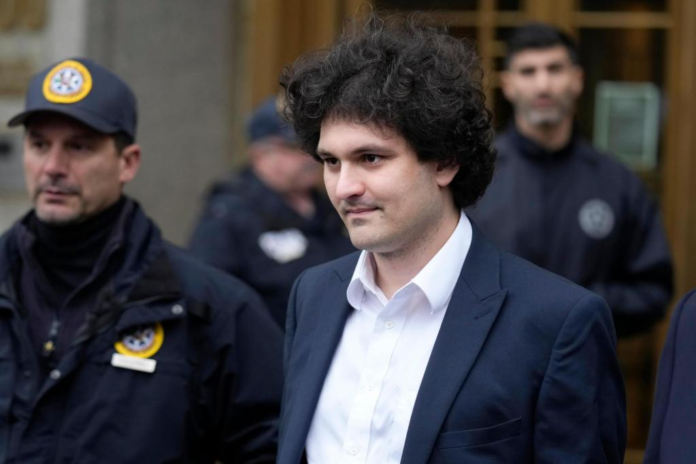From his Brooklyn prison cell, Palo Alto’s disgraced cryptocurrency mogul, Sam Bankman-Fried, has described a harrowing existence of surviving on bread, water and peanut butter and denied adequate internet access to prepare for his trial in October.
But the entrepreneur’s spectacular rise and fall has made for an amazing story, and Berkeley author Michael Lewis and other figures in the entertainment industry are finding ways to cash in, according to a report in The Ankler.
“The Blind Side” author has scored a massive payday for “Going Infinite: The Rise and Fall of a New Tycoon,” his upcoming book about the schlubby-chic son of Stanford Law school professors. Apple paid Lewis $5 million for the rights to his book, presumably to turn it into a film or limited TV series, several sources told the entertainment-news outlet. Given that Lewis spent a year embedded with Bankman-Fried, known as SBF, his book and subsequent Apple project promise a fly-on-the-wall account of Bankman-Fried and his collapsed FTX empire, “a symbol of crypto hubris gone awry,” as the New York Times said.
Lewis’ book, which marks the author’s latest coup, is scheduled to publish Oct. 3, around the time that Bankman-Fried is expected to head to U.S. District Court in Manhattan to stand trial for alleged wired fraud, commodities fraud, money laundering and related conspiracy charges.
But “Going Infinite” — the book and Apple’s planned filmed project based on it — is just one of at least eight known Hollywood projects in the works that are based on Bankman-Fried’s story, according to The Ankler report, “Inside Hollywood’s SBF Mad Scramble.”
In November, Amazon ordered an eight-episode limited series about the FTX scandal, which the streamer was planning to fast-track before the writers strike, The Ankler reported. New York Times’ columnist Andrew Ross Sorkin also has an SBF-related project in the works, as does Graham Moore, the Oscar-winning screen writer of “The Imitation Game,” drawing on reporting from a New York Magazine story. Mark Wahlberg’s production company is also developing some kind of property. Finally, Bankman-Fried is expected to get the serious documentary treatment by filmmaker Nanette Burstein, who has been working on a project since early summer and promises “exclusive inside access.”
The Ankler report said that Hollywood was “at Peak Grifter” when news broke in November about the collapse of FTX, which wiped out almost $9 billion in unaccounted-for customer funds. Before and after Bankman-Fried’s subsequent arrest in the Bahamas, Hollywood has been feeding America’s appetite for TV series and films about real-life fraudsters, such as Theranos founder Elizabeth Holmes and socialite Anna Delvey, colorful figures who shocked, infuriated and fascinated the public with their audacious schemes for conning people out a lot of money.
It remains to be seen to what extent America will have an appetite for entertainment based on the life and alleged schemes of Bankman-Fried, and which of the competing projects will best capture the attention of viewers and critics.
On one hand, Bankman-Fried isn’t as outwardly glamorous as Holmes or Delvey, with the New York Times fashion critic Vanessa Friedman saying he captured an extreme, “schlubby” version of Silicon Valley’s business casual aesthetic, appearing in public with the “most unkempt bed-head” and T-shirts and cargo pants that looked like they had been slept in.
But the Bankman-Fried story has proved “riveting” in so many other ways, The Ankler said. For one thing, Bankman-Fried has appeared to be enamored of talking about himself and what he did related to FTX, the Ankler said. It also helps that he, like Holmes and Delay, has led a life of extraordinary privilege, which gives his story an almost aspirational quality.
Before becoming a billionaire and studying at MIT, Bankman-Fried grew up as the adored, indulged oldest son of esteemed Stanford law professors, Joseph Bankman and Barbara Fried. Among other things, it’s been reported that their scholarship and actions around their son’s FTX empire suggest they encouraged a belief in him that he shouldn’t let himself be constrained by the ethical norms that apply to most people.
In that vein, the Bankman-Fried narrative also offers the intrigue of seeing arrogant elites getting their comeuppance. Consider the public’s outrage when Bankman-Fried was freed on an unprecedented $250 million bail, which allowed him to remain on home confinement in his parents’ spacious home on the Stanford campus — a luxury not afforded to the majority of federal defendants. There, Bankman-Fried had internet access and was able to play video games and watch sports, while meeting with journalists, presumably including Lewis, and working with lawyers to construct his defense.
As is well known, Bankman-Fried squandered that luxury when prosecutors presented evidence that he twice tried to interfere with witnesses in the case. Last month, the judge overseeing his case, Lewis A. Kaplan, revoked his bail.
Now, Bankman-Fried sits in a detention center that has become infamous over its struggles with staffing shortages, freezing conditions and other problems, the New York Times reported. Last year, the National Association of Criminal Defense Lawyers issued a statement that said M.D.C.’s conditions were “inhumane.” For Bankman-Fried, these “inhumane” conditions include a disruption of his vegan diet, and dwindling supplies of his prescription medication, including Adderall, which treats A.D.H.D.
As Bankman-Fried remains in custody, it’s not known whether he’s aware of Hollywood’s “mad scramble” to turn him into its next major anti-hero. But his pretrial detention, and possible incarceration in federal prison if convicted, could provide a dramatic coda to any of the movies or TV series that are in the works.


